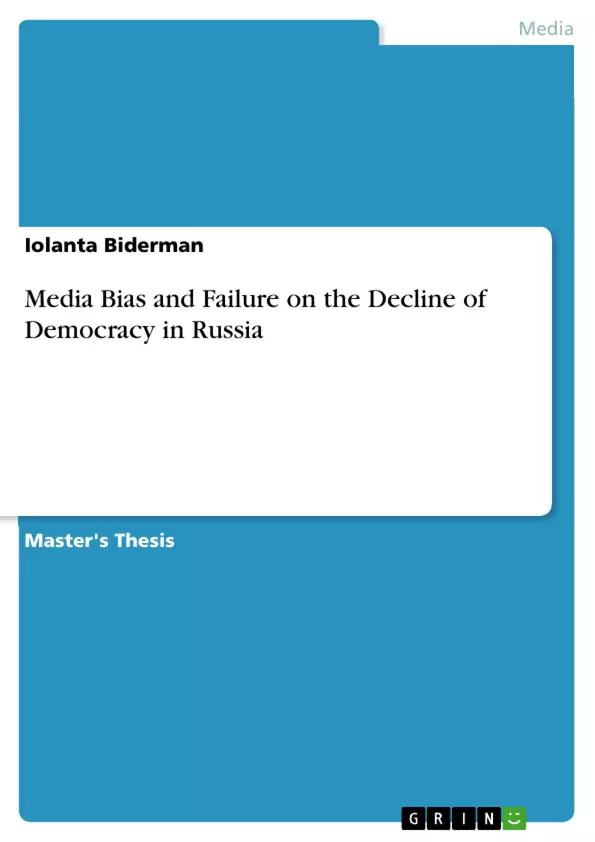There is a common view among Western scholars, politicians, and media professionals that Russia continues to be an authoritarian state, due to its history, and that it has recently begun to stray away from democratic processes or even slide back into moderate totalitarianism. Even worse, The Freedom House report (2009) ranked Russia one of the world’s most repressive societies, putting it next to Rwanda. However, this and other reports present a distorted picture of democratic development in Russia, which reflects conflicting views between the Western and Russian understanding and measurement of democratic and non-democratic media systems, press pluralism, ownership structures, relative autonomy from the state, negative and positive control of press content, the role of ideology, and the legal frame that protects freedom of speech.
Inhaltsverzeichnis (Table of Contents)
- Chapter 1: Introduction: Problems in understanding Russian Development and Governance.
- Chapter 2: Standards on journalism Theories and reality.
- 2.1 Western Standards on mass communications.
- 2.2 The critique and myths of the theories.
- Chapter 3: Models and the path of democracy.
- 3.1 Theories and definitions
- 3.2 Media and Democratic governance.
- Chapter 4: The End of the history postponed. Perestroika and Glasnost. Yeltsin's reforms in politics. Economics, crime and politicization of the media. Putin's democracy.
- 4.1 From Gorbachev to Yeltsin to Putin. Premises for media transformation and ownership.
- 4.2 Bloody democracy. Yeltsin's reforms.
- Chapter 5: Russia's Mass Media at the turning point of political globalization.
- 5.1 Managed democracy is a necessity.
- 5.2 Reactionary West and evidence monitoring.
- 5.3 Questions and data on constraints of informational penetration.
- Chapter 6: Notes on the Western media content: to Russia with hate.
- 6.1 Issues in the Russian-US political agenda.
Zielsetzung und Themenschwerpunkte (Objectives and Key Themes)
This thesis aims to investigate the degree to which media bias in Russia, both pro-Kremlin and independent, hinders democratic development. It also examines whether the situation in Russia is uniquely undemocratic compared to other nations. The analysis will use a combination of criteria, methods, and press content to understand the tensions created.
- The impact of media bias on democratic development in Russia.
- Comparison of the Russian media landscape with other countries.
- Analysis of Western and Russian perspectives on Russian democracy.
- The role of the Chechnya conflict and geopolitical factors in shaping media narratives.
- The influence of historical context (Soviet legacy) on current media dynamics.
Zusammenfassung der Kapitel (Chapter Summaries)
Chapter 1 introduces the prevailing Western view of Russia as authoritarian and challenges this perception by highlighting conflicting interpretations of democratic development. It lays out the thesis's central arguments and methodology.
Chapter 2 delves into Western standards of journalism and their applicability to the Russian context, critically examining existing theories and exposing their limitations.
Chapter 3 explores various models of democracy and the role of media in democratic governance, providing a theoretical framework for the subsequent analysis.
Chapter 4 examines the political and economic transformations in Russia from Gorbachev to Putin, emphasizing the role of media in shaping public opinion during this period and the government's response to it.
Chapter 5 analyzes Russia's media landscape in the context of globalization, focusing on the government's strategies for managing information and controlling media narratives.
Chapter 6 focuses on the portrayal of Russia in Western media, exploring potential biases and the impact on the Russian-US political relationship.
Schlüsselwörter (Keywords)
Media bias, Russian democracy, political development, journalism, media control, Chechnya conflict, geopolitics, Western media, propaganda, Putin, oligarchs, Soviet legacy, democratic governance.
Frequently Asked Questions
What is the main argument regarding Russian democracy in this thesis?
The thesis challenges the distorted Western view that Russia is sliding back into totalitarianism, highlighting conflicting interpretations of democratic development between the West and Russia.
How does media bias affect Russian politics?
The study investigates how both pro-Kremlin and independent media bias influence the path of democracy and public perception within the country.
What are the differences between Western and Russian media standards?
There are conflicting views on press pluralism, ownership structures, and the degree of state control that define what constitutes a "democratic" media system.
How did the transition from Yeltsin to Putin change the media landscape?
The thesis examines the shift from the chaotic reforms and "bloody democracy" of the Yeltsin era to the "managed democracy" associated with Putin's governance.
Is Western media portrayal of Russia considered biased in this work?
Yes, the work includes notes on Western media content, suggesting a "hate-filled" portrayal that impacts Russian-US political relations.
What role does the Chechnya conflict play in media narratives?
The conflict is analyzed as a significant geopolitical factor that has shaped media control and narratives in Russia.
- Citar trabajo
- Iolanta Biderman (Autor), 2010, Media Bias and Failure on the Decline of Democracy in Russia, Múnich, GRIN Verlag, https://www.grin.com/document/183263



